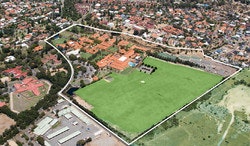Year 11 Mathematics Specialist ATAR
This is an ATAR course which provides opportunities, beyond those presented in the Mathematics Methods ATAR course, to develop rigorous mathematical arguments and proofs, and to use mathematical models more extensively. The Mathematics Specialist ATAR course contains topics in functions and calculus that build on and deepen the ideas presented in the Mathematics Methods ATAR course, as well as demonstrate their application in many areas. This course also extends understanding and knowledge of statistics and introduces the topics of vectors, complex numbers and matrices. The Mathematics Specialist ATAR course is the only ATAR mathematics course that should not be taken as a stand-alone course.
Unit 1
This unit includes the following three topics: combinatorics; vectors in the plane; and geometry.
Unit 1 of the Mathematics Specialist ATAR course contains three topics that complement the content of the Mathematical Methods ATAR course. Reasoning is continued explicitly in Geometry through a discussion of developing mathematical arguments. While these ideas are illustrated through deductive Euclidean geometry in this topic, they recur throughout all topics in the Mathematics Specialist ATAR course. Geometry also provides the opportunity to summarise and extend students' studies in Euclidean Geometry. An understanding of this topic is of great benefit in the study of later topics in the course, including vectors and complex numbers.
Vectors in the plane provides new perspectives for working with two-dimensional space and serves as an introduction to techniques that will be extended to three-dimensional space in Unit 3.
Combinatorics provides techniques that are useful in many areas of mathematics, including probability and algebra. All topics develop students' ability to construct mathematical arguments.
The three topics considerably broaden students' mathematical experience and therefore begin an awakening to the breadth and utility of the course. They also enable students to increase their mathematical flexibility and versatility.
Unit 2
This unit includes the following three topics: trigonometry; matrices; and real and complex numbers.
Trigonometry contains techniques that are used in other topics in both this unit and Unit 3. Real and complex numbers provides a continuation of students' study of numbers, and the study of complex numbers is continued in Unit 3. This topic also contains a section on proof by mathematical induction. The study of Matrices is undertaken, including applications to linear transformations of the plane.
ASSESSMENTS
Assessment will include investigations: 20% | tests: 40% | examinations: 40%.
REPORTING
A brief interim report on class work and behaviour will be issued towards the end of Term 1. The achievement for the course will be reported as a College A - E grade as well as a percentage mark for the course and an examination mark for both Semester 1 and the year. In addition, the student's approach to class work and behaviour will be reported via the usual key performance indicators.
STUDENT EXPECTATIONS
Students are expected to:
- bring the required text, calculator and stationery to each lesson
- complete regular homework from a variety of sources including the text, worksheets and MathsOnline
- be aware of assessment dates and have prepared thoroughly for each assessment
- be proactive in seeking help from the teacher when required.
